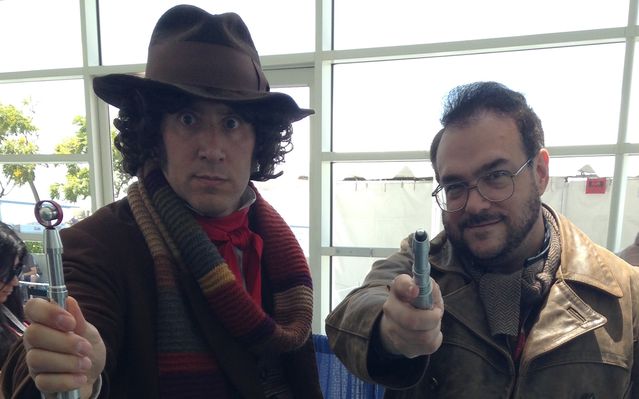Freudian Psychology
Would "Doctor Who" Call Freud, Jung, Myers & Briggs Stupid?
How would Doctor Who's alien Time Lord regard Freudian or Jungian psychology?
Posted March 7, 2016
"You know, the very powerful and the very stupid have one thing in common. They don't alter their views to fit the facts. They alter the facts to fit the views - which can be uncomfortable if you happen to be one of the facts that needs altering."
- The Fourth Doctor in classic Doctor Who serial "The Face of Evil," part 4 (1977).

In his book The Discovering of Being (1983), existential psychologist Rollo May criticized the psychodynamic ideas spread by both Sigmund Freud and Carl Jung as being too rigid and unable to adapt to different situations. Without rejecting everything they'd proposed, May asserted that therapists who apply psychodynamic theory as a one-size-fits-all method to interpret all patients' needs had less success in understanding what was really going on. "These thoroughly experienced (psychiatrists and psychologists) became disquieted over the fact that, although they were effecting cures by the techniques they had learned, they could not, so long as they confined themselves to Freudian and Jungian assumptions, arrive at any clear understanding of why these cures did or did not occur or what was actually happening in the patients' existence," wrote May (p. 39). A conceptual approach that helped one client, May held, would not work for them all and "redoubled efforts to perfecting the intricacies of one's own conceptual system" failed to produce great benefits. Instead of trying to make each client fit the same views, their work could benefit from altering views or even considering alternative views entirely.
After Sigmund Freud and Carl Jung had fleshed out their basic theories, did they then start altering facts to fit their views - behavior that the lead character on the TV series Doctor Who attributed to "the very powerful and the very stupid"? Jung himself criticized Freud for being too inflexible, calling himself dogmatic for rigidly defending his views on how sexuality and the unconscious mind shape our actions and personalities (e.g., Jung's 1906 preface in The Psychology of Dementia Praecox). Others expressed similar criticisms - like psychologist Henry Murray (American Journal of Psychology, 1940): "If Freud had been more of a scientist, he would have pressed no claims to be one. Dogmatism is anti-scientific; and there are reasons to distrust a 'truth' that forms a sect." Even Freud (Werke, XIV, p. 217f) said he presented his ideas "dogmatically as if they were a finished doctrinal edifice. But don't suppose that it immediately came into being that way like a philosophical system."
What would the time-traveling hero of the BBC's science fiction series think of Freud? Or Jung, for that matter? How about the Myers-Briggs test developed from Jungian ideas? To those of you unfamiliar with the series, this might seem like a strange question. For now, I'm simply posing the question for those Whovians out there who also know enough about the psychology to debate the issue. Would the Doctor, who has used hypnosis and repressed a number of his own memories, find them insightful or unscientific?
The character meets many historical figures in the course of his travels. According to a 1996 television movie originally titled simply Doctor Who, the Doctor regarded Freud favorably on one point.
Eighth Doctor: "At least Freud would have taken me seriously."
Grace: "Not if he'd met you!"
Eighth Doctor: "We did meet."
That's not the same as endorsing Freud's theory, however.
(FYI for those of you reading despite unfamiliarity with Doctor Who: The Fourth and Eighth Doctors quoted above are both versions of the same character. The Time Lord "regenerates" with a new a new face as an in-story explanation for why he is played by a different actor each time. This has been going on for more than 50 years, our time.)
So to those of you who know Who, I ask you: Would the Doctor lump Freudians and Jungians in with "the very powerful and the very stupid?" I'd love to hear your thoughts. I've already formed my own but I'll share those in Doctor Who Psychology: A Madman with a Box. I'd love to consider any alternate points of view (and cite accordingly, of course).

Related Posts:
- Doctor Who: "Listen" to Your Fear
- Doctor Who and the Neuroscience of Morality Malfunctions
- Doctor Who: Regeneration and a Dilemma of Doctor Identities
- Doctor Who: The Man Who Regrets and the Man Who Forgets
- Doctor Who: Fear the Weeping Angels and Don't Blink
You can follow me on Twitter as @Superherologist or find me on Facebook at https://www.facebook.com/drtravislangley. I'd love to hear from you!


